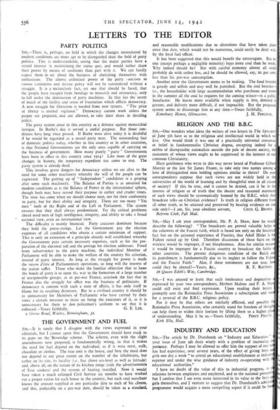THE GOVERNMENT AND FUEL
Sta,—It is rarely that I disagree with the views expressed in your editorials, but I cannot agree that the Government should have stuck to its guns on the 'Beveridge scheme. The scheme, even with the slight amendments now proposed, is fundamentally wrong, in that it makes the need for fuel depend on the individual, as if it were meat, milk, chocolate or clothes. The true unit is the house, and here the need does not depend to any great extent on the number of the inhabitants, but rather on its size, its locality (i.e., feet above sea-level as well as latitude) and, above all, on the nature of its kitchen range (vide the advertisements of F.sse cookers) and the system of heating installed. Now it would have taken a much enlarged Civil Service six months to have worked out a proper ration for each house in the country, but each coal merchant knows the amount supplied at any particular date to each of his clients, and this, preferably on a pre-war date, should be taken as a standard,
and reasonable modifications due to alterations that have taken place since that date, which would not be numerous, could easily be dealt with by the local fuel officer.
It has been suggested that this would benefit the extravagant. B it no one (except perhaps a negligible minority) buys more coal than he eeds Why indeed should he? But with careful economy almost all :ould probably do with rather less, and he should be allowed, say, zo per cent. less than his pre-war consumption.
Another error the Government seems to be making. The food hoarder is greedy and selfish and may well be punished. But the coal hoar er-- i.e., the householder with large accommodation who purchases and stores in the summer all the coal he requires for the coming winter—is a public benefactor. He leaves more available when supply is less, demand is greater, and delivery more difficult, if not impossible. But the proposed system seems to discourage him at any time.—Yours faithfully,


























 Previous page
Previous page